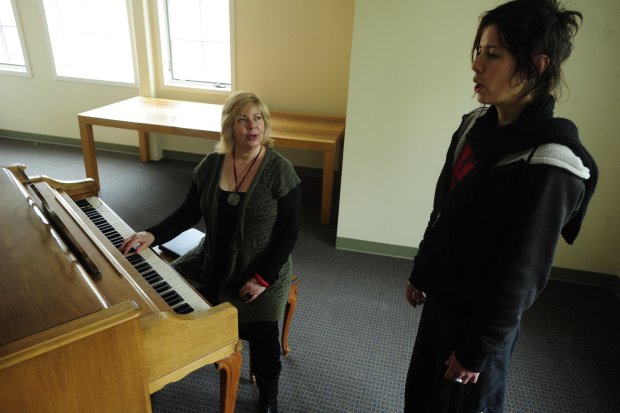 Image via lindalewellyn.com
Image via lindalewellyn.com
Nicer tone, a wider range, more support, and more control over your voice are all improvements in your singing that will happen with private voice lessons. You can also learn a lot of background information about the styles and genres of music you want to sing, or even learn about new styles you haven't heard of yet. Learning how to sing in a healthy, open, and relaxed but controlled way will provide more longevity in your career or with your hobby. Sounds pretty great, right? A key factor in all of this, though, is choosing a voice teacher with the know-how, time, and energy to guide you there. When you find the right fit, you can do amazing things. Here are the most important qualities of a teacher and good teaching practices to look for.
1. Training and background in the style(s) of music in which you want to be trained
Before reaching out to potential voice teachers, take the time to write down the styles of repertoire you would like to work on. If you find that you're interested in having a more supported and versatile sound as a rock singer, an opera teacher might not be the best fit. Or if you need help preparing for musical theater auditions, someone who's best known as a folk singer-songwriter won't be the most effective choice.
Many teachers are well-versed in a wide range of music, and certain concepts in vocal production do overlap styles, but the best use of everyone's time and money is usually to go directly to someone who is an expert in the field you're interested in, or who has experience in all of the styles that you're interested in.
2. A reputable education in vocal anatomy
Beware of vocal coaches, especially in the pop world, who claim to be vocal technicians who could function as your sole voice teacher. A lot of coaches are great for improving vocal stylization, stage presence, an artist's look, and audience engagement, but have no background in the actual physical instrument you're using. This leads to a lot of misinformed teaching that ignores vocal health and the possibility of voice loss, inflammation from overuse or misuse, or even vocal cord lesions or hemorrhaging. Hiring a pop or rock coach as your only teacher would be akin to an athlete hiring a stylist or director from a commercial shoot to be her sole athletic trainer. It wouldn’t make any sense at all and could lead to injury.
[Vocalists: How to Avoid Burning Out in the Recording Studio]
3. A warm personality
It's okay if you have great respect for your teacher and are in awe of his or her talent and accomplishments so much so that you might even feel a bit intimidated, but your teacher should still be warm and engaging enough to keep you feeling comfortable at lessons. We all learn best when we trust that our teachers have our best interests at heart, and though they're there to critique our performance in order to improve our skills, they should still be consistently encouraging and amiable.
4. An effort to create individualized curriculum
If you found your teacher through a recommendation from one of his or her current students and you figured out after a few months that you were assigned the exact same exercises and songs in the exact same order as your friend, this is not a good sign. Each voice is as distinctive as a thumbprint, and each student has unique interests and works at his or her own pace. A great teacher recognizes each student's strengths and chooses music that highlights those, while also being mindful of what a student needs to work on, and chooses music that is challenging but well-suited to the individual.
Plus, you've got to have some interest in what you're working on. The best teachers are good at recognizing what a student is passionate about and try to find music that encourages that excitement.
5. A knack for making everything you study relevant to you
Singing is the only form of music that utilizes language, so it's also a form of communication: a way of storytelling and sharing ideas. Man, is it rich in human experience. Our world and cultures have changed since a lot of the music that we still perform today was written, but a lot of basic human emotions and relationships are still the same.
Teachers who can get their students to relate to the text, whatever it may be, and bring their own life experiences to the music or characters they are playing, help to create very powerful and relatable performances. Thinking in those terms as a student also makes for a very enriching and fulfilling performance experience.
6. A schedule that works with yours
If you're looking for someone who is available to teach weekly lessons, make sure you're clear in asking for a commitment to that before starting. Teachers are often performers as well and can be out of town for long periods of time. If you're okay with that, great! If not, make sure to ask about the teacher's calendar up front to avoid big gaps in training. Be honest with yourself in how often you'll actually practice and how often you'll be able to schedule lessons, and then find a teacher who can accommodate what you need.
7. Ability to provide in-person lessons
Skype sessions can be very helpful and convenient, but some in-person sessions are also needed for vocal work. Things like pitch, timbre, posture, and breathing are easier to assess in person, and the online delay can be tough to deal with if your teacher is also providing your instrumental accompaniment. I guess I'm a bit old-school in my teaching philosophy – I believe that a face-to-face human connection is needed for the most functional flow of information going back and forth between a teacher and student, and that the live, in-room vibrations during vocal production are very important to be felt and heard by both people. Like I said, online lessons are definitely not a waste of time, but do find someone who can meet with you in person as well.
[Top 5 Exercises to Warm Up Your Voice Before a Show]
8. Similar values and ideals in regards to the learning process
You don't want to work with a teacher who expects you to practice two hours every day if you know up front that you can't accomplish that. You also wouldn't want to work with someone who's very laid back about timeliness or sticking to a consistent schedule if that bothers you. Think about what you value in terms of things like creating goals, planning, communication, and work ethic, and try to find out if the teacher you have in mind has your same values. Just ask! You could avoid a lot of frustration and miscommunication if you do.
9. Energy!
I had an elementary school piano teacher who actually dozed off during lessons! Oh, dear. Even at a very young age, I knew that that was not an effective teaching method. Singing is animated! There's a lot of acting and expression involved, and the act of singing is an aerobic activity in itself. It requires a ton of energy, and a great voice teacher knows that being energetic and enthusiastic as an instructor helps to encourage the student to bring more energy to the music-making and learning process.
10. A caring attitude
You don't need to be best friends with your teacher. As a matter of fact, it's probably better if you aren't. A teacher, however, should know a little bit about who each of his or her students is outside of lessons. Your teacher can't help make the music more relatable to you if he or she doesn't know anything about you and never takes the time to ask. If your teacher knows your personality traits and values, you'll feel more respected and comfortable. An instructor should care about each student's health – especially vocal health – and about how life is going for each student in general.
One-on-one mentoring, with attention to detail in lesson planning specific to each individual, and with energy and a smile, is very powerful and even therapeutic. Teachers who truly care and try their hardest to do all of these things make learning more about singing a fantastic and enriching experience.
Erika Lloyd is a classically trained artist with a bachelor's degree in Voice Performance Early Music from Indiana University and a passionate, dedicated vocalist and artist who is constantly thriving on the exploration and expansion of her ever-evolving career. Erika’s work in cross-genre performance and composition led to the Grammy Award-winning ensemble Chanticleer arranging and performing Erika’s song, “Cells Planets.” She recently released her first album, Power, and teaches vocal and piano lessons in NYC. Check out her website and find her on Facebook.


